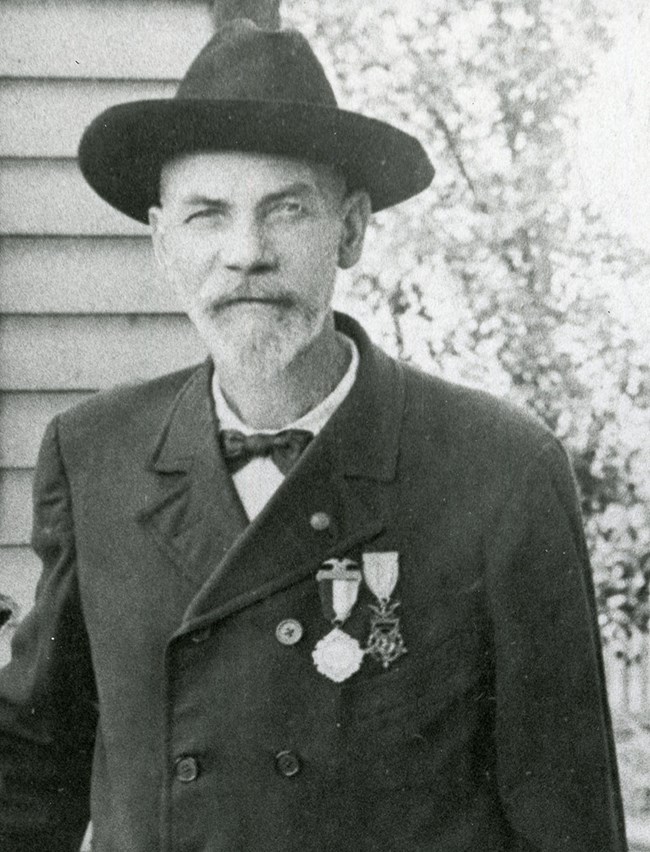
Wilson's Creek National Battlefield Five soldiers received the Medal of Honor for heroism at Wilson's Creek:Nicholas Bouquet On December 21, 1861, President Abraham Lincoln signed into law the Act of Congress creating the Medal of Honor. It was the only military award authorized during the American Civil War. At that time, the Medal of Honor was presented for meritorious actions that would not necessarily be recognized by the Armed Services today. A total of 1,520 Medals of Honor were awarded during the Civil War. Nicholas Bouquet
Bouquet's action was profiled in the 1905 work Deeds of Valor: An Exciting Chase We all wanted to have a whack at the Rebels before going home, and, as luck would have it, Company D, to which I belonged, along with Company E, were detailed by Lieutenant-Colonel Merritt to support Totten's Battery. This order brought us into a hand-to-hand contest with the enemy, and, although we were engaging a superior force, we four times repulsed them. Bouquet later served in the 25th Iowa Infantry and died on December 27, 1912. He is buried in Burlington, Iowa.
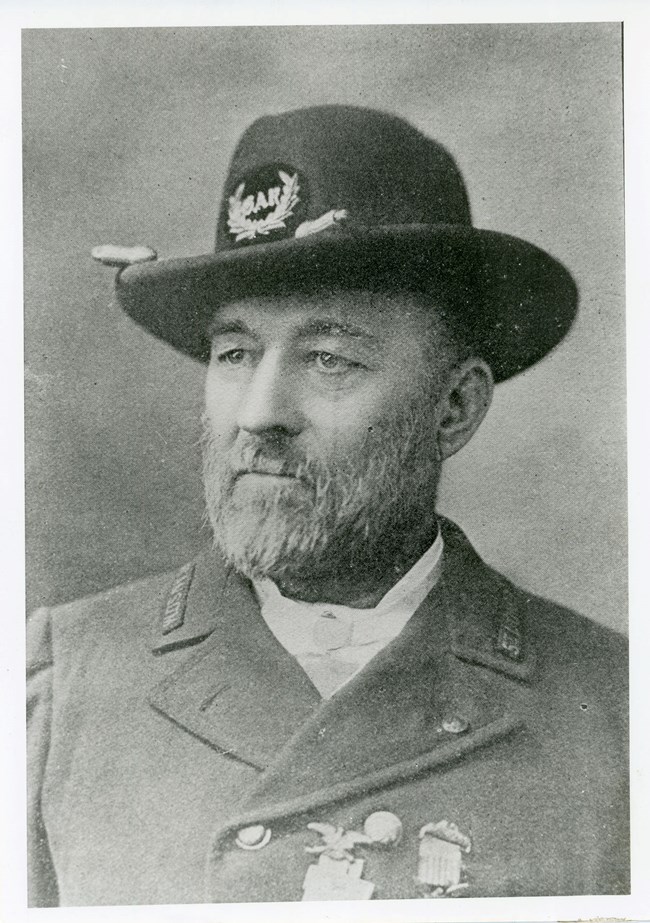
Wilson's Creek National Battlefield Lorenzo Dow Immell
Two comrades testified to Immell's heroism at Wilson's Creek. William T. Williams: I remember seeing him advance between the enemy and our lines and cut loose the lead team, which had been killed, then mount the saddle horse of the swing team and save the caisson of Corporal Writtenberry's piece, which had been abandoned by all drivers and men, and I remember our whole line cheering him. I also saw him take a mule, put it in place of one of the wheel horses which had been shot, take an axe and cut a small tree, on which the piece was fast, and save the gun; also, saw him advance, under a hot fire, and get a horse belonging to the enemy. . . . Also, remember Capt. Jas. E. Totten's telling him he was the bravest man he ever saw , and that he would be rewarded. Immell later served in the 1st Missouri Light Artillery. He died on October 31, 1912, and is buried in the National Cemetery at Jefferson Barracks, St. Louis, Missouri. 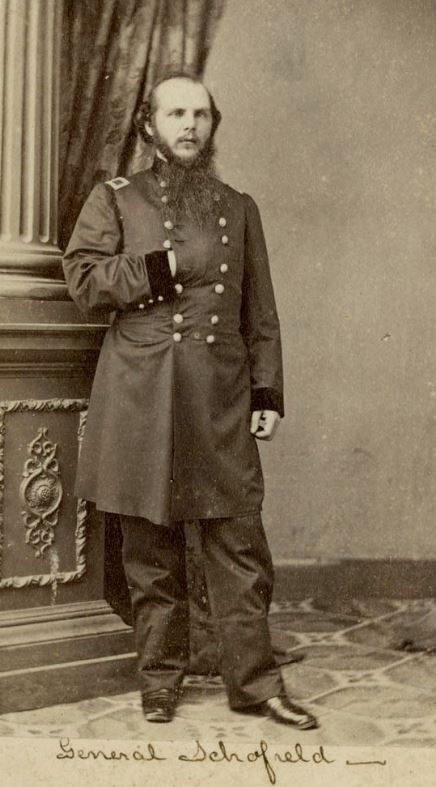
Wilson's Creek National Battlefield Museum Collection, WICR 30699 John McAllister Schofield
He had been told by General Lyon to take charge of the left while the General himself would lead the right, and Major Schofield, having lost his horse, passed over to the left and, shouting to the somewhat disordered ranks to follow him, rushed towards the enemy and was soon engaged in the thickest of the fight. Indeed, his position for a while was most threatening. He had intended to lead the left at 'charge bayonets' upon the enemy, but the firing of the enemy became so sharp that some of the men who were following him in the rear returned the fire, and Major Schofield for a time seemed destined to be killed in the cross-fire. For his special act of gallantry on this occasion. . .Major Schofield was complimented and particularly mentioned in the report of Major Sturgis, General Lyon's successor. Schofield became commanding general of the army in 1888 and was promoted to lieutenant general in 1895. He died on March 4, 1906, and is buried in Arlington National Cemetery. 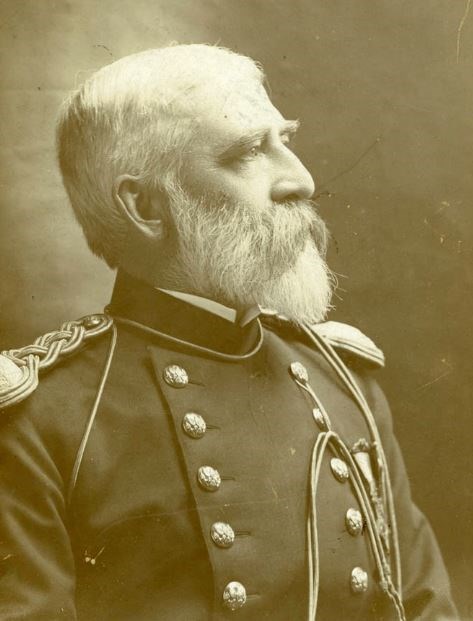
Wilson’s Creek National Battlefield Museum Collection (WICR 31671) William M. Wherry
Lieutenant S.O. Fish of Company D, 1st Missouri Infantry described Wherry's actions at Wilson's Creek: About 9 o'clock the Company occupied a part of the general line and was especially in support of a section of Totten's battery. We had suffered seriously in the fierce contest which had preceded and about this hour were heavily assailed by fresh troops and a most destructive fire, under which the men recoiled and the Company broke and abandoned the line. While I was engaged in the utmost endeavor to rally the men, and while my efforts seemed almost hopeless, Lieut. Wm. M. Wherry. . .seeing my dilemma and quickly realizing the danger of losing the guns of the battery, came to my assistance. Lieut. Wherry displayed unusual coolness and heroism. He aided me in stopping the men and infused renewed confidence among them, got them back into the line and remained with me until the guns and position were safe. Wherry also served in the Spanish-American War and was promoted to brigadier general. He died in Cincinnati, Ohio, on November 3, 1918, and is buried in Bellefontaine Cemetery, St. Louis, Missouri. 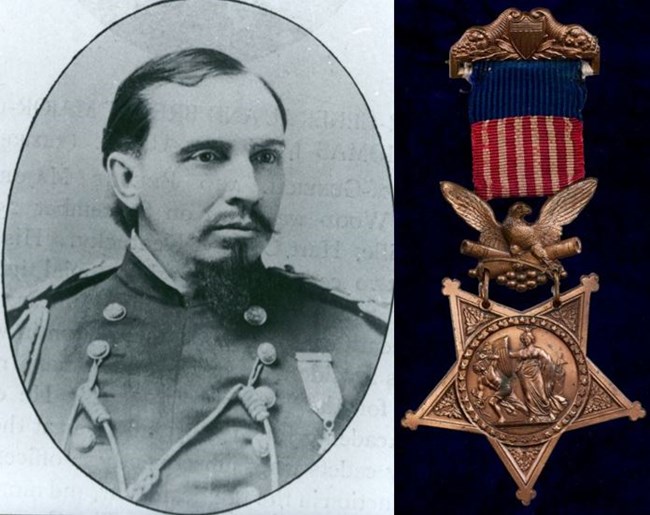
Wilson's Creek National Battlefield Museum Collection Henry Clay Wood
The two particular acts of gallantry and distinguished conduct. . .are, first, the stand made by the Rifle Recruits, my command, after the other companies of the First Infantry Battalion had retreated, and my conduct in holding them on the line of battle fighting, until peremptorily ordered by Captain Plummer to retire; and Second, without being called there, in alone making my way from the Battalion in rear to the front line of battle to report to Captain Gilbert, receiving an order from him to Captain Huston in rear, and again joining Gilbert on the front line with a message from Huston, which act Gilbert writes of 'as one of conspicuous gallantry.' Wood retired from the army as a major in 1896 but was advanced to the rank of brigadier general in 1904. He died on August 30, 1918, and is buried in Arlington National Cemetery. |
Last updated: August 19, 2020
